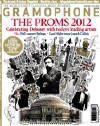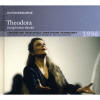Texte paru dans: / Appeared in:
* 
GRAMOPHONE (07/2012)
Pour s'abonner /
Subscription information
Glyndebourne
GFOCD01496

0878280000146 (ID242)
Reviewer: David Vickers
Glyndebourne’s landmark Theodora from
their archive ...
The first staged production of Theodora was as long ago as
1926 but Glyndebourne’s iconic 1996 production smashed the Handel revival
kicking and screaming into the awareness of casual opera-goers. This was the
first time Glyndebourne had ever put on its own production of any Handel
music drama (they’ve done three since), and the team responsible also
rehabilitated a relatively obscure tragic oratorio that had been an abject
failure for Handel in 1750. The uninitiated were shocked to discover that
Theodora possesses an abundance of profound dramatic issues, subtle
characterisations, superb choruses of theatrical power, gorgeous arias and
heart-rending duets.
This live recording is culled from six performances preserved in Glyndebourne’s extensive independent archive, so it is not identical to the Channel 4 television broadcast that has been issued on DVD (Warner Classics, l/O5R). The special qualities remain intact without the visual dramatic elements but musical matters that were dodgy 16 years ago have not evaporated with age. Dawn Upshaw’s mannered Theodora is swoopy and rhythmically uneven, although there is no denying her sincerity. Avid Handelians must own this just for Lorraine Hunt’s singing of ‘As with rosy steps’, which abounds in integrity and humanity (although William Christie adds an unnecessary oboe to the da capo). David Daniels has never made a better studio recording than his nobly courageous Didymus. The Roman martyr’s compatriot Septimius is sung ardently by Richard Croft; the unfurling vocal and orchestral limes in ‘Descend, kind pity’ are shaped compassionately.
My biggest reservation is Christie’s needless tinkering with Handel’s orchestrations: several slow arias feature inauthentic reduced strings and throughout the oratorio he finds all kinds of uses for flute where Handel did not. The chorus of would-be opera stars makes a mess of contrapuntal choral textures, largely on account of strident competing sopranos failing to sing cleanly in dialogue with other voices, although the dramatic coloration of the voices yields special results in the sombre opening of ‘He saw the lovely youth’. The OAE’s playing (Orchestra of the Age of Enlightenment) is routinely marvellous; Christie’s pacing and characterisation of Handel’s music are satisfyingly lyrical (more so than Paul McCreesh or Nicholas McGegan, whose fine recordings have different virtues to commend them). By the time we come in the final tragic scenes (the duet ‘Streams of pleasure’), one can sense that the post-picnic Glyndebourne audience is stunned by the gravity of what they are witnessing. Christie’s later Erato version recorded in 2000 (with a mostly different cast) is more consistent musically but has little of the emotional impact that makes the Glyndeboume release such a compelling document.
Abridged version
Fermer la fenêtre/Close window
Cliquez l'un ou l'autre
bouton pour découvrir bien d'autres critiques de CD
Click either button for many other reviews


